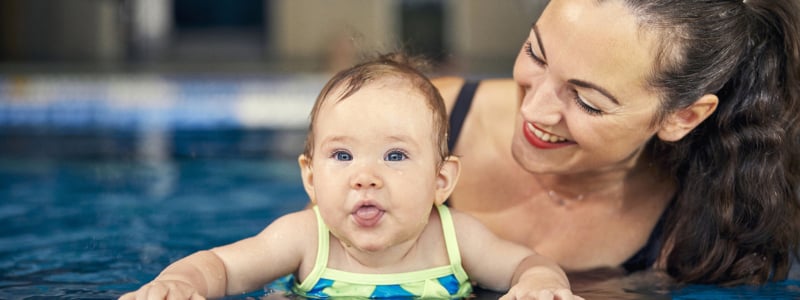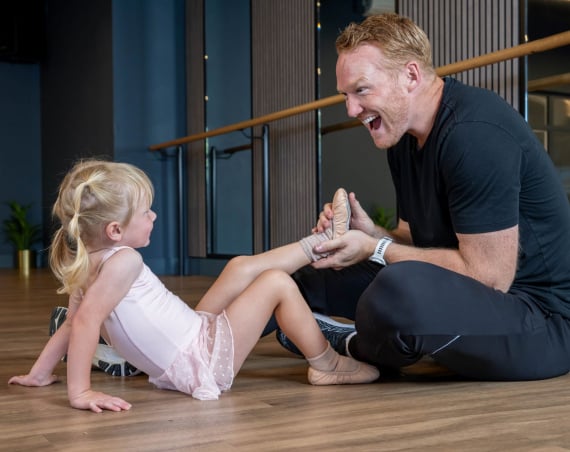Swimming lessons aren’t only great fun for kids. They’re the most effective way to help young future swimmers feel comfortable in the water — and you can never be too young to get a head start. Swimming lessons for babies are designed specifically to ease infants into the water safely. Check out our guide to baby swimming lessons to see what your little one will learn.
When can babies start swimming?
Little ones are safe to start lessons at any age, but most programmes are geared towards babies three months and older. It’s always recommended to check with your health visitor before signing up for lessons.
New mums should hold off on swimming immediately after pregnancy because of a higher risk of infection. The NHS recommends waiting at least six weeks after labour before resuming vigorous exercise, but the wait may be shorter for a low-impact workout like swimming. Even so, your baby can’t safely swim if you can’t safely swim, so you may need to wait if the plan is to take lessons together.
What are baby swimming lessons like?
Programmes for the youngest swimmers are all about introducing babies to the water and spending quality time together. Classes are quite small, so each parent-and-child pair has one-on-one attention from an instructor. Expect plenty of games, songs and play to keep the mood lifted.
Guided classes usually follow a set structure. For instance, our instructors use the Swim England “Learn to Swim” curriculum. In general, baby swimming lessons tend to be shorter, lasting around 30 minutes. Keeping it brief avoids overwhelming little swimmers (no one wants a meltdown!).

The benefits of swimming for babies
Swimming is an essential life skill for kids and one they’ll have tons of fun learning. There are benefits at each stage, even for those earliest swimmers; think of it as the groundwork for more advanced strokes and skills further down the road. Here are just some of the benefits babies get from swimming:
It’s a fun way to bond
Swimming lessons give you quality one-on-one time with your baby. The time you spend together in the water helps build trust.

It develops coordination skills
Did you know swimming can help a baby’s balance outside the pool? Because the water provides body support, the energy and focus go exclusively towards improving coordination.
It helps with sleep
Swimming engages the whole body, so it’s good exercise for little ones. Naturally, the more energy they put into swimming, the more tired they’ll be when it’s time to nap or sleep.
It gives them confidence in the water
Starting early makes a difference. Taking swimming lessons together with your child helps them feel safer in the water and more confident to try new things.
How to prepare for a baby’s first swimming lesson?
There is work you can do ahead of time to make sure you and your beginner swimmer are prepared. Here’s what we recommend before signing up:
- Start with bath time
Bath time is always lots of fun and a great introduction to water. Using a small plastic cup or jug, try gently pouring water on the baby’s hair or lightly sprinkling it across their face. Over time they’ll get used to the sensation and, hopefully, lessen the intensity of a first swim.
- Know about pool safety
It never hurts to come prepared, so ask about course structure and swim instructor credentials for any class. Reputable programmes will have no problem providing you with this information.
- Work on your baby’s schedule
Choose lessons that fit into your baby’s routine. Avoid signing up for a time that disrupts feeding or is in the middle of their regular naps. You want them to come to the water feeling positive, not fussy, hungry or tired.
- Remember to keep a positive attitude
Your mood does a lot about how their swim goes. If you’re smiling, playful and clearly comfortable in the water, it will rub off on your baby. Babies can pick up on your mood and take safety cues from you, so you can really set the tone.
- Be patient
Listening is important. If you’re in the pool and have a baby that won’t stop crying and screaming, take a break. It’s okay to go at their pace instead of pushing when they aren’t ready.

Tips on what to bring to your first swimming lesson
Here’s what should be on your swim class checklist to make sure you have the right supplies to enjoy each lesson:
- A pair of fluffy towels
- Poncho towel or hooded towel for baby
- Swim nappies, either reusable or disposable
- Swim costume for baby
- Small water toys to keep their interest
- Changing mat, if already not supplied
- Change of clothes and underwear for you and baby
Ready to dip your toes in? The swim school is in session at all our locations, with kids swimming lessons for swimmers as young as three months. Under the guidance of our capable instructors, your infant will learn something new and have fun — and as a member, you can always enjoy lots of other great facilities at your local David Lloyd Club.
Find a club



